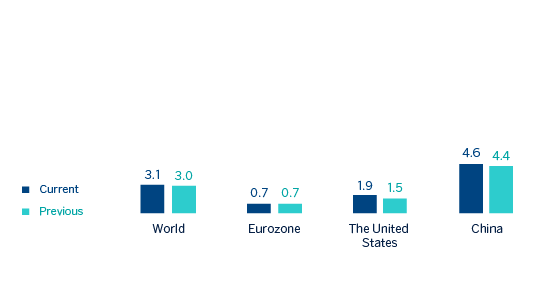Macroeconomic environment
The high inflation, the tightening of monetary conditions and the gradual fading of the positive effects linked to the reopening after the COVID-19 pandemic have contributed to a slowdown in economic activity in recent quarters. However, the slowdown has been, in general, less abrupt than expected, and economic activity remains relatively dynamic, particularly in the United States and in the services sector, thanks to the dynamism of the labor markets, expansionary fiscal policies and the gradual fading of supply shocks triggered by the pandemic and the war in Ukraine.
The resilience of aggregate demand has contributed to inflation remaining relatively high in the first months of 2024 (3.5% in the United States and 2.4% in the Eurozone in March 2024), after decreasing significantly since mid-2022.
According to BBVA Research, it is most likely that inflation will moderate in the next months, enabling the start of a gradual process of relaxation of monetary conditions around mid-2024, which would take monetary policy interest rates to around 4.75% in the United States and 3.25% (in the case of the deposit facility interest rate) in the Eurozone by the end of 2024.
BBVA Research forecasts that global growth will be approximately 3.1% in 2024, close to the estimated GDP growth for 2023 and slightly over the previous forecast (3.0%). In the United States, the strong domestic demand has supported a GDP growth of 2.5% in 2023 and a revision of growth forecasts for 2024 to 1.9% (40 basis points above the previous forecast). In China, structural challenges to avoid a fast economic deceleration remain, but a series of stimulus measures have enabled a greater than expected dynamism of activity in the past few months and a 5.2% GDP growth in 2023. The GDP growth forecast for 2024 has been adjusted somewhat upwards to 4.6% (20 basis points above the previous forecast). In the Eurozone, economic activity came to a standstill in the last months, reinforcing the low growth prospects. After expanding by around 0.5% in 2023, the forecast of the GDP expansion is expected to grow 0.7% for 2024 (with no change compared to the previous forecast).
Although it is expected that inflation will gradually moderate both in United States and Eurozone, and it is likely to remain low in China, it is most likely that inflationary pressures -and, therefore, interest rates- will continue to be above the levels observed before the COVID-19 pandemic due to the geopolitical factors, such as the war in Ukraine and the armed conflict in Middle East, and to other factors like protectionist policies, an expansionary fiscal stance and climatic shocks. Indeed, these factors increase the uncertainty about the evolution of the global economy and the risk of having a higher inflation and interest rates than currently expected.
GDP GROWTH ESTIMATES IN 2024
(PERCENTAGE. YEAR-ON-YEAR VARIATION)

Source: BBVA Research estimates.